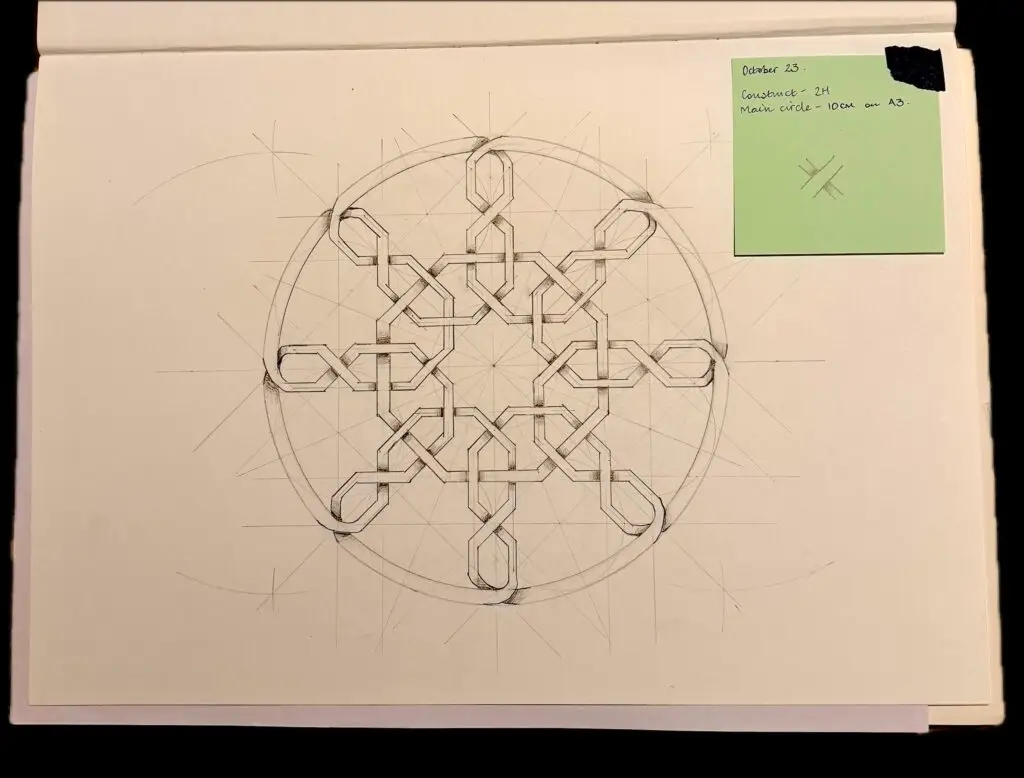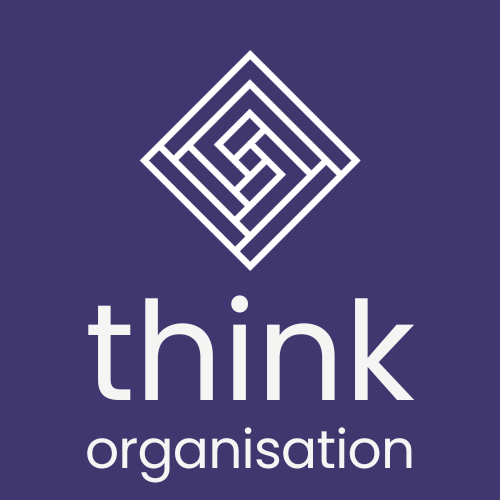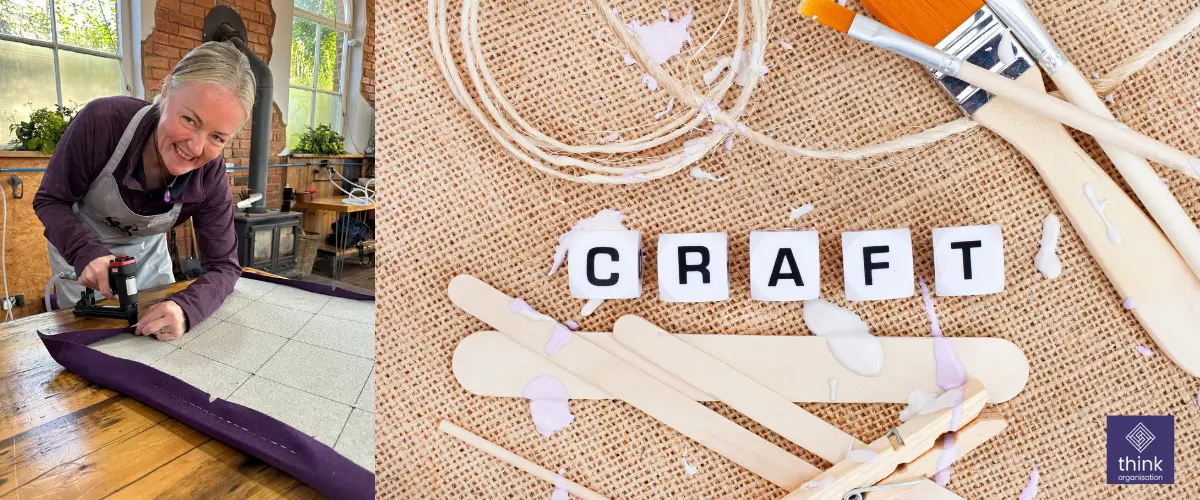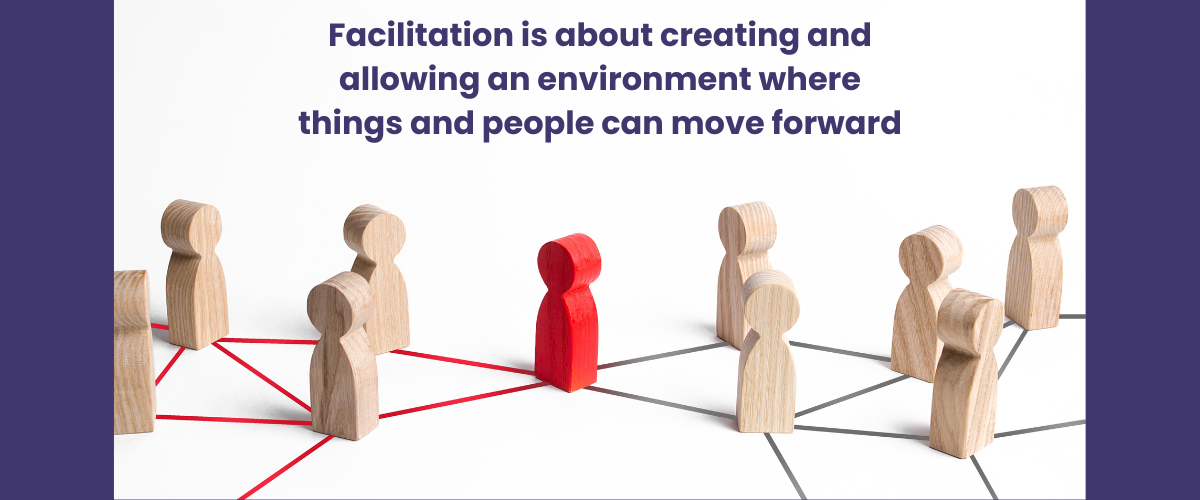The other week, our Co-Founder Sarah joined the amazing Emma Semper on one of her upholstery crafting workshops, where she learnt how to upholster her very own noticeboard. For those of you who haven’t met Sarah, she is not someone who would naturally call herself creative, especially compared to Steph’s awesome upholstery and craft talents – as shown below, her newest hobby of geometric art using only a compass, a ruler, and a pencil – something she created and built one afternoon.

Anyway, back to the point. Here at Think we are often extremely busy, and this can make it difficult to find time to slow down, especially when you throw in all the outside work commitments as well.
In fact, many of us are seeking ways to slow down, reconnect with ourselves, and protect our mental health. Whilst many of us turn to doom scrolling our phone, reading or watching short videos to turn off our mind, in reality, these could be having negative impacts.
Which is why one surprisingly powerful yet often overlooked tool is crafting.
Whether that is knitting, painting, woodworking, sewing, pottery, upholstery, leatherwork or any creative activity done with your hands.
Crafting isn’t just a hobby; it’s a form of therapy.
Research has consistently shown that engaging in creative activities can lead to reduced stress, improved mood, increased cognitive function, and even physical health benefits. Over ten years ago, a study by the American Journal of Public Health concluded that arts engagement is linked to better emotional resilience, reduced anxiety, and an enhanced sense of purpose.
During lockdown, Sarah organised an online event for over 100 employees to undertake some painting led by an artist. The feedback was amazing, and due to the success of the painting experience, a couple of people continue this craft to this day, five years later.
So here is some insight into why crafting can be so powerful for your health and wellbeing:
1. Crafting is Mindfulness in Action
Crafting draws you into the present moment.
Whether you’re looking for a number on paint by numbers, choosing a colour, threading a needle or shaping clay, you naturally focus on the task at hand. This gives your mind a break from the constant buzz of worries and future plans.
As Psychologists, we can call this a “flow” state. You will have heard people say, ‘I don’t know where the time went’, or ‘I just got into the flow and then suddenly it was done’. Csikszentmihalyi (1990) explains this in more detail in his book, as when you are fully immersed in an activity, or a state of flow, it is linked to greater happiness and lower rates of depression. The key with crafting is to find a craft which gets you into that state of flow, not one that completely frustrates you. Enjoyment is vital.
2. Building Confidence and Achievement
Completing a project, no matter how small, gives a tangible sense of achievement. These little wins accumulate, boosting self-esteem and reminding us that we are capable of creating something meaningful. This can be especially powerful for individuals managing long-term stress, anxiety, or burnout.
Crafting provides this achievement, and the majority of crafts are in your control. Sarah tried painting following the event she organised, but it became frustrating, especially when the painting looked worse than what a child could do, however the actual painting was great fun.
Enter into Sarah’s life, painting by numbers. It provides the right amount of guidance, and a sense of achievement as there is a framework to follow for success. This is key to building confidence and ensuring there’s a sense of achievement.
3. Crafting Connection and Community
Many crafting activities, from knitting groups to art classes, create opportunities for social connection. Having a shared purpose can reduce feelings of isolation, a key factor in maintaining good mental health. For some people, crafting is a solitary pursuit, however, for others, being part of a community is key – whether online or face-to-face. Getting advice, watching tips on You-tube or attending events, all of these can help build a sense of connection.
4. Stress Reduction and Physical Health
There have been years of studies measuring the impact of crafting on health. Crafting has been found to lower blood pressure, improve immune response and even ease symptoms of chronic illnesses.
When you’re creating, your body moves into a calmer parasympathetic state, counteracting the harmful effects of prolonged stress. At the start, crafting can often push us out of our comfort zone, but with support and practice we soon enter a state of flow. Growing, stretching ourselves and doing crafts we enjoy is crucial.
If you feel incompetent, bad or don’t enjoy a craft then try a different one.
5. A Healthy Escape
In moderation, crafting provides a healthy form of escapism. The reason we say in moderation is because we don’t want it to become a chore. Recent requests for paint by numbers by friends and family members was something which soon became a chore for Sarah – especially when there were three needed to be completed before Xmas!
After a break, and with no intention of ever agreeing to requests again, paint by numbers had become a healthy escape again. It is a chance to reset and recharge. It is not about avoiding life’s challenges, but about giving your mind the rest it needs to tackle them with renewed energy.
In a world that often prizes productivity over presence, crafting reminds us of the simple joy of making something with our own hands.
You don’t need to be “good” at it. You just need to start.
So this week, whether it is 15 minutes of doodling at your desk, joining a painting class or learning a new craft from YouTube, try incorporating creativity into your life. Think about what you enjoyed as a child, as this will help you narrow down some crafts you might enjoy. Because one small, enjoyable change today will lead to a positive impact on your health tomorrow.
Your mental wellbeing is worth the time.
If you would like to know more about crafting at work and how crafting can be built into your organisational culture or development programmes, please reach out – [email protected].
#MentalHealth #Wellbeing #Creativity #Mindfulness #PersonalDevelopment #CraftingForHealth #CraftingCulture



